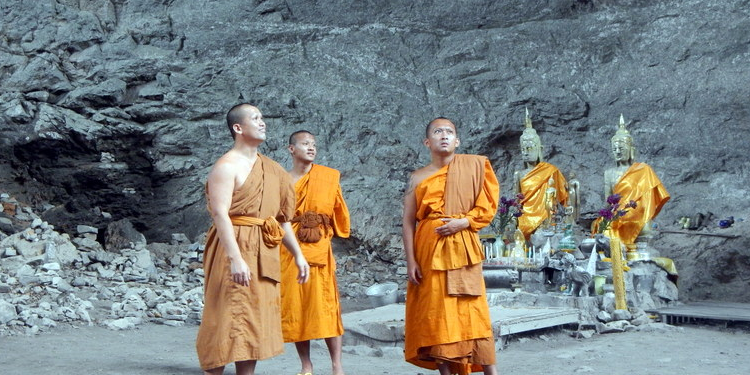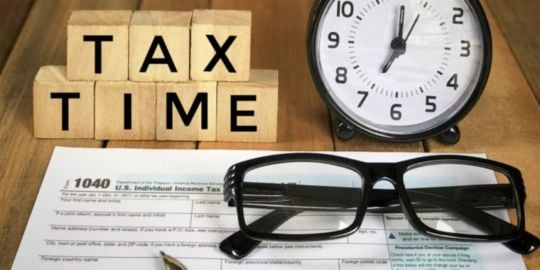Hi John, can you introduce yourself briefly and tell us about your projects in Thailand?
I'm an artist and writer from the US who has been living 'temporarily' by hook or by crook in Thailand for 14 years. After a few years of bouncing around from big city to small city to tiny town I ended up in Kanchanaburi, home of the River Kwai and world famous Death Railway. I have been by turn a teacher, antique and furniture exporter, mining consultant and motorcycle guide. I live in a cheap little house tucked into the scrub jungle at the foot of some limestone hills where I plot out my days with a dog named Joe.
Why did you choose to live in Thailand?
I didn't actually make a conscious choice to live in Thailand. In 2002 my life in New York sort of disintegrated. A friend of mine who was living in Bangkok found me a job and convinced me to come and live for a year. I had been to Bangkok before and didn't much care for it, after living there for a year I quit my job and left the apartment thinking I would travel for a while around the country and then move on. Now 14 years later I still feel as if I may pack up and leave any day now.

How were your first steps in the country ? Was it easy to find accommodations and to integrate Thai society?
I had an apartment, job and motorcycle within days of arriving in the country. It helped that I knew a couple of people in Bangkok already but it, and many other cities in Thailand, have so many foreigners living in them they can feel like western colonies.
This however doesn't mean that I or most foreigners living in Thailand integrate into Thai society. The initial language barrier makes integration difficult at first but even for the few who become conversant or even fluent in Thai, real assimilation is very rare. The cultural differences are great and to span that takes a person willing to give up their very natural prejudices and even personal aesthetics. Beyond that a foreigners legal status in Thailand is perpetually that of an alien living year to year on various visas. By law a foreigner cannot own property or a business. In fourteen years I have met only one foreigner who has managed to become a Thai citizen. Add to this the fact that unless a person knows you, no matter what you may be doing, no matter where you are Thais will assume you have just arrived and will be leaving soon. Both Thai law and culture ensure that in some ways everyday living in Thailand is like your first day in Thailand.

How can you describe Thai culture?
Thai culture remains an enigma to me. Always posing questions and often providing contradictory answers. Maybe the most important aspects of the culture are the concepts sanook, mai pen rai and krang jai. The first meaning fun, that is to inject some fun into all activities whether doing back breaking work in a rice paddy or attending a funeral there should be some sense of satisfaction and fun. The second mai pen rai is perhaps the first expression a foreigner learns in Thailand. It means never mind, forget about it, it's not important and may be the lynch pin to understanding Thai thinking as it immediately forgives and forgets transgressions and problems. This leads to the last term, Krang Jai which is about face, making efforts not to offend, upset or disrespect anyone.
That's the guide book version anyway. The flip side of all of the forgiveness and offering of respect demanded by Krang jai is that Thai people are often bottled up so that when they do feel disrespected or become offended they blow up wildly. The selflessness taught in Buddhism perverts into selfishness. Thai people are generous but Thailand is known the world over as home to scammers and con artists. It is a land of strict laws with no enforcement and a deep routed patriotism that often manifests as xenophobia.
As a foreigner you will be expected to abide these complicated cultural rules to some extent but they will not necessarily be reciprocated. Thailand self promotes as the land of smiles and that is superficially true. Only that slogan doesn't explain that a smile in Thailand is the default facial expression and can mean either ' you are very welcome' or ' I am going to run you down with my car'.
What does your everyday life look like in Thailand? The rhythm must be different than in US right?
My years in Thailand have seemed to slip by quickly with little to distinguish the passing of months and years. I have always be single and mostly unemployed here so the rhythm of my life is a little chaotic. Often I live completely to my own schedule. Waking up to go cycling in the hills that separate kanchanaburi from Burma, eating, working on my various projects, reading and napping in my hammock, having dinner with friends and sleeping when I see fit. This is interrupted by short usually intense periods of frantic work, sometimes for a week others for a couple of months. In New York my life was more dictated by the cost of living and the laws of the land not so true here, and also somewhat by that vague western ambition to succeed which I no longer feel.

Do you have a good knowledge about the local job market? What are the most dynamic economic sectors?
Where I live there is a very small job market for foreigners even as the town bloats. Most are teachers at the various government and private schools, maybe a few have legal status working in the tourist industry, and a very few may have some NGO type position. Outside of this there really is no legal work to be found in Thailand outside of the major cities for foreigners.
I suppose the most dynamic economic sector in Kanchanaburi at the time is the building boom that is linked to the future opening of the Asia Highway 2 that will run through town into Myanmar and continue on to China. This has lead to serious a building frenzy and has fed a major increase in domestic tourism to the province, Kanchanaburi is now the premier weekend destination for Bankokians. I don't really see any of this having an effect on potential jobs for foreigners in the province since all of those jobs would be for Thais or ASEAN members only.
The country is very touristic, are there differences between the coast and the lands? (way of living for example)
Thailand is very touristic in places, and most of those tourist places are on the coast. Cities like Phuket and Pattaya are like Disney Land or Las Vegas, they are places of make believe where foreigners come to live a Siamese dream. As I mentioned earlier they feel like western colonies with the locals only acting as servers and touts but in 99% of the country western influence is still fairly weak. It is still very easy to find places where foreigners, and western culture have little little influence both on the coast and elsewhere.
Probably the first thing people notice when they leave the big cities is that western food basically disappears. Thailand is famous for its food and Thai's are extremely proud and fiercely dedicated to it. Most provincial Thai's don't eat western style foods and have no interest in trying it. The other difference is that foreign languages disappear. Very few people outside of cities and tourist spots speak anything but Thai with the exception of occasionally shouting YOU, HEY YOU, when they see a foreigner.
Of course being up country the pace of life is a bit slower. People are apt to live a bit more on their own terms and all cultural constraints are more relaxed. So people will be sleeping on the shop floor when you walk in, or driving on the wrong side of the road when it's more convenient and generally less worried about appearance and style. I think people are also friendlier, less pushy and more apt to mai pen rai problems in general.

Thailand is facing a wave of terrorist attacks. How people and government are reacting?
I can't agree that Thailand is facing a wave of terrorist attacks. The few very limited acts of terrorism that have been enacted in the kingdom in the last few years pale in comparison to what is happening weekly in both central Europe and the US and of course there is no comparison with countries in greater Asia or the middle east. The rebellion or insurgency or what ever you might want to go call the violence in the southern provinces has been going on with flair ups for fifty years but is almost completely contained to those three areas. In my opinion Thailand is a fairly safe place overall and that includes Bangkok unless you invite trouble.
The government In Thailand is always changing. In the years I've lived here there have been four military coups. At the moment there is a military junta in power. Immigration requirements and laws pertaining to foreigners have always changed suddenly and erratic, the present government is no exception though some of the changes they've made have been positive overall, there does seem to be a significant uptick in anti-foreign sentiment coming down. That being said the temperature of the government rarely seem to effect the attitudes of everyday people.
Any advices for a soon-to-be expatriate in Thailand?
My advise to anyone considering a move to Thailand is to come and experience living here before making a permanent move. I have seen many people over the years who come on holiday, fall in love with that experience and decide to move here based on that. Living here and vacationing here are very different prospects. Being a foreigner in Thailand means that you have very limited rights and abilities under the law. It means that you will be singled out day in and day out, some times for special considerations but at least as often as a mark. I think the most important point is to make the effort to learn the language from the very beginning, not only speaking but reading and writing as well. This will open up daily interaction with normal Thai people you meet in shops or in the streets and will let you be less depend on people who might take advantage of you.
As everyone is looking for different things in life so the experience of moving and living in a different culture will reflect that. If your looking to come to Thailand to retire on your pension, live in a big expat city and play golf the transition will probably be seamless. If on the other hand your looking to come here and make a living somehow and live up country I think the time will be more rewarding but certainly a more difficult transition. First and foremost to getting along in Thailand is showing respect, a wai and a smile can dissolve most problems and improve almost any situation.

















Contact us to be featured in the Interviews section.
Participate